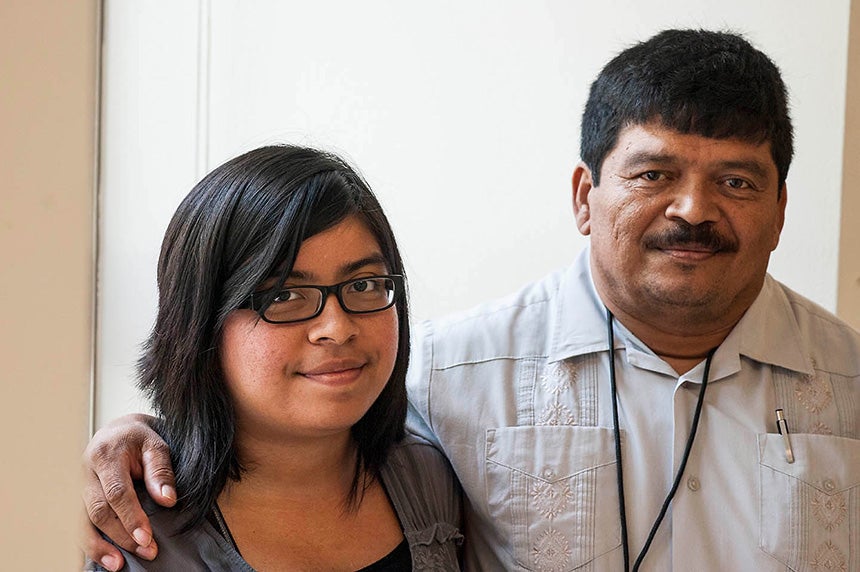Teen Lobbies for Farmworker Protections
18-year-old Selena Zelaya of Mount Dora, FL, was one of about a dozen farmworker advocates who traveled to D.C. to lobby for farmworker protections against harmful pesticides. Selena’s mother and father are farmworkers and from a young age she began advocating on behalf of them and others. Selena shares why she is so committed to

This page was published 12 years ago. Find the latest on Earthjustice’s work.
Last week, I interviewed 18-year-old Selena Zelaya of Mount Dora, Florida. Selena was one of about a dozen farmworker advocates who traveled to D.C. in July to lobby for farmworker protections against harmful pesticides. Selena’s mother and father are farmworkers and from a young age she began advocating on behalf of them and others. She returns to D.C. this week with representatives of Florida and North Carolina to meet with congressional representatives.
In the interview, Selena shared why she is so committed to the fight for farmworker protections:
Q. Why do you come to D.C. to lobby on this issue of farmworker rights?
A: I think it’s an important issue. My parents suffer from pesticide exposure and I think it’s important that everyone is aware of this issue—and I think it’s important for young people to get involved because this issue affects their future.
Q: When did you get involved in this?
A: My dad was already volunteering for the Farmworker Association of Florida when I was born so I was always around this issue.
Q. How did it feel when you first came to D.C. in July?
A: It kind of felt like a new experience, a learning experience. It felt good to do something for my parents and for other farmworkers.
Q: Why are you coming back to D.C.?
A: To see if anything has been done, if there has been any resolution and to encourage them and to say, “Look, you said you would do this; you said you would make changes, and we want to see the changes you promised.” It’s been 20 years since [the EPA’s Worker Protection Standard has been updated] and our communities are dying, there are diseases and everything.
Q: Were you nervous when you were meeting with Florida congressional offices in D.C.?
A: I was very nervous; I’m a very shy person. It takes a lot to make me talk. But it was an issue I had to speak up about. When it’s something important, I like to speak my mind.
Q: Have you noticed any improvements for farmworkers since your D.C. visit?
A: No, not really. Some of them still complain. They still say that sometimes there aren’t signs; there isn’t even water to drink sometimes. Nothing has really been done since my visit to D.C., which is really sad because something should be done.
Q: Aside from all the work you do advocating for farmworkers, what other hobbies and interests do you have?
A: I’m trying to learn how to play the violin. I hang out with friends and I recently got a job working part-time at McDonald’s. I also play a little bit of drums and guitar. I watch the Food Network because I like cooking so that entertains me.
Q: How much of your time is devoted toward this issue of farmworker advocacy?
A: It’s a pretty big part of my life because I always volunteer when the Farmworker Association of Florida calls me up for something. I’m probably working with them about six or seven times a month. I help my dad with pesticides training where we educate farmworkers on their rights.
Q: Where do you go to college and what do you want to be when you grow up?
A: I’m a freshman at Seminal State College. I haven’t declared my major yet, but I want to do something along the lines of helping people. Maybe physical therapy. I just want to help people, that’s all I want to do.
Q: What is the final thing you’d like to say about this issue of farmworker protections and advocacy?
A: It affects more than just the farmworkers and their families. It affects the people eating the products. It’s not even safe for us to eat some of that stuff. The exposure to pesticides in foods is going to affect all of our health.
You can also read about Selena at Civil Eats, a news source covering sustainable agriculture and food systems.
And for more photos from Selena’s lobbying work in Washington, D.C. last July, see Photos: Farmworkers Demand Protections From Pesticides.
Selena’s mother Reina Lemus de Zelaya is also working for stronger protections for farmworkers from hazardous pesticides—read about her story in Farmworker Mother To EPA: We Deserve Protections.
Established in 1989, Earthjustice's Policy & Legislation team works with champions in Congress to craft legislation that supports and extends our legal gains.